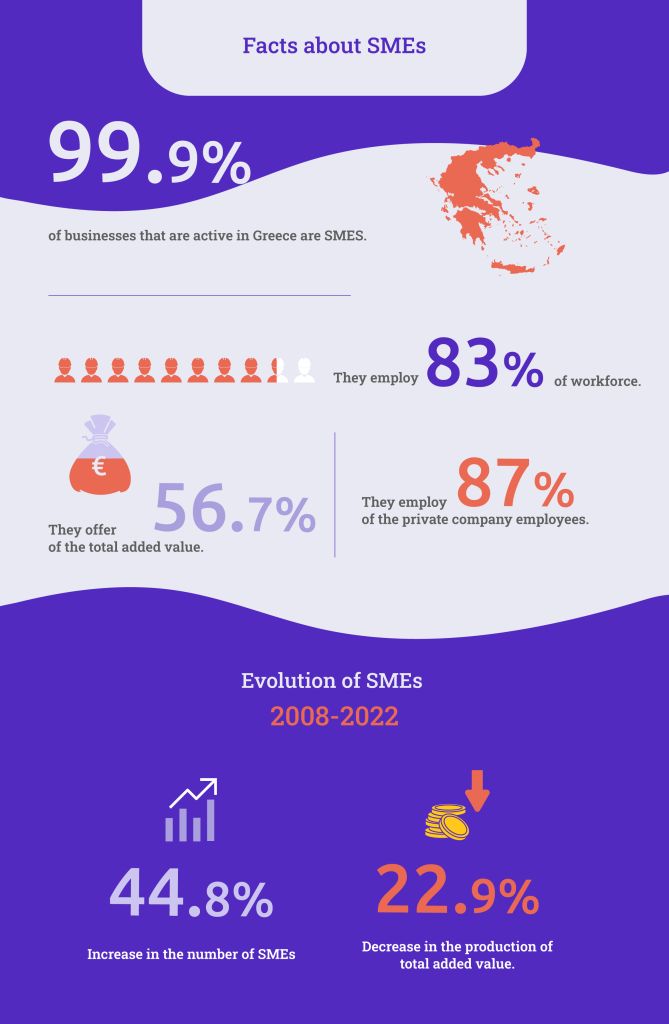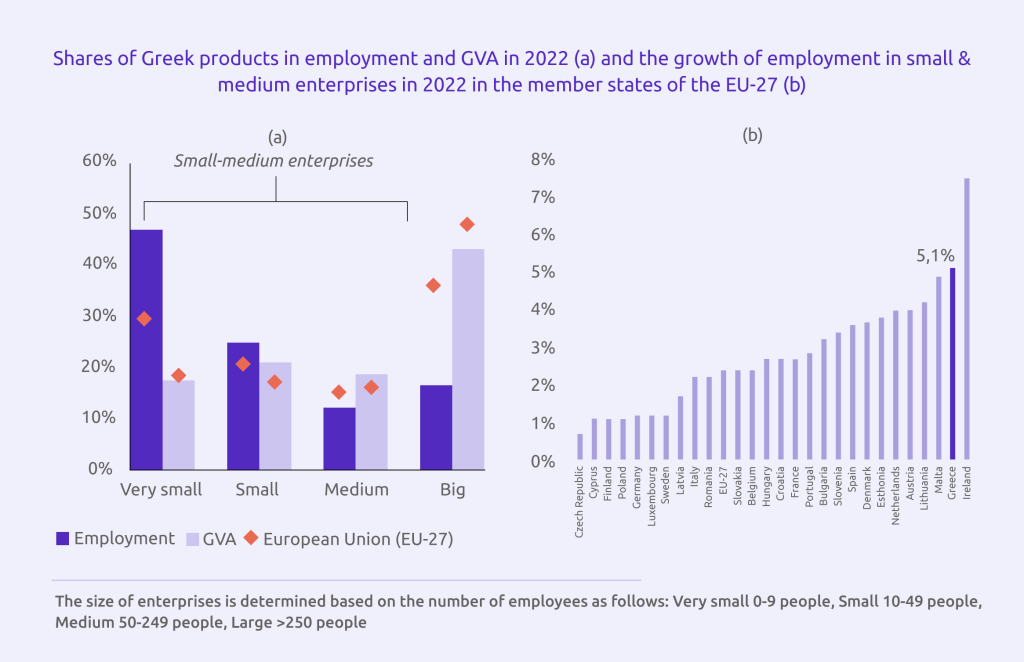Small and medium enterprises were, are and will be the core of our economy, representing an important pillar of growth and employment. In recent years, however, SMEs growth has faced many challenges, such as the economic crisis in Greece, the pandemic and the consequences of geopolitical developments.
Their survival and, even more, the SMEs growth is a challenge with significant ramifications for society and economy. Although there is no one-size-fits-all growth recipe for SMEs, there are some key points that modern entrepreneurs should not ignore.
In this article, we will speak in the business language of entrepreneurs, listing the common challenges they face during their development process, as well as the necessary strategies they must adopt to achieve the desired sustainable development in the modern business.
Let’s start!
More specifically, in this article we will see:
- SMEs in Greece
- The SME market and the next day
- The new challenges for SMEs
- What does the new situation mean practically for SMEs?
- Sustainable development for SMEs growth and Digital Tansformation
- Examples of Modern Digital Solutions and Technologies
SMEs in Greece
The importance of small and medium enterprises in Greece is truly impressive! These businesses represent 99.9% of all businesses in the country, employ 83% of the workforce, provide 56.7% of total value added and 87% of private sector workers.
These figures significantly exceed the average of the European Union, offering a significant contribution to the Greek economy.
Nevertheless, the research highlights key weaknesses of the sector, such as the high degree of fragmentation, low productivity and limited extroversion. As a solution to these challenges, the research proposes a new development model for SMEs growth. This model focuses on business expansion, whether through natural growth, mergers, acquisitions or other forms of collaboration.
Such an approach will create economies of scale by increasing productivity and enhancing the extroversion of SMEs. This way, growth will be achieved for small and medium enterprises in Greece! Through this process, SMEs will manage to create a growth cycle that will push them to fully exploit their potential and play a greater role in the economic development of the country.

The SME market and the next day
Although the Pandemic has shaken Greek Business, SMEs seem to have managed to survive, and in some cases to grow.
The variations observed during the pandemic that affected the medium-term operation of SMEs depend mainly on changes in consumption habits. In particular, in order to deal with the problem, most Small and Medium Enterprises turned to state aid that provided immediate liquidity, helping 84% of the sector to remain resistant to the new condition.
Today, 4 years after the end of the Pandemic, the landscape has completely changed. According to the estimates of the European Commission from 2022, the number of these enterprises amounted to 36.8 thousand with approximately 648 thousand employees. At the same time, however, value-added output in 2022 lagged behind 2008 significantly, suggesting that small business productivity – measured by output per employee – has not recovered to pre-crisis levels!
Although this situation is similar in the European Union, it appears more intense in our country. To clarify, according to Eurostat data for 2020, the productivity of very small enterprises in Greece amounted to only 17% of the productivity of large enterprises, while the corresponding percentage in the European Union was 48%.

The new challenges for SMEs growth
Entering the so-called 4th Industrial Revolution is now a reality and perhaps the biggest challenge for every modern business, regardless of size.
In an era where new trends, such as structural changes in the workplace and digital and environmental transition processes dominate, businesses are faced with increased demands and rapid developments. Today, business success depends on factors related to international orientation and flexibility. Their integration is not just a question of survival, but of ensuring sustainable SMEs growth in this new context.
What does the new situation mean practically for SMEs?
It is now time for Greek SMEs to focus on investments related to Green Development, strategic partnerships, and innovation. SMEs that manage to rapidly adopt these new technologies will ensure not only their survival, but also a competitive advantage over other businesses in the industry!
By correctly choosing the available technological means to meet and cover their needs and at the same time by training their executives with up to date skills, they will achieve the desired increase in productivity with a corresponding reduction in costs.
The multitude of digital solutions that are now available worldwide open up new possibilities for development and connection with the market. However, it is particularly important that Organizations have knowledge of their Business Working Flow in order to address and choose the most appropriate Solution.
So for the next decade, the adoption of digital solutions will not only be the main business for technology companies, but it will be a vital growth tool for any progressive business that recognizes the opportunities through digital tools and its full integration into the market.
Sustainable Development for SMEs growth and Digital Transformation
A panacea in the implementation of Digital Transformation is now the European Union through the “Digital Decade” initiative. This action, developed by the European Commission, defines the following main objectives:
- By 2030, three out of four companies will be using Cloud, Big Data and Artificial Intelligence services.
- Nine out of ten SMEs should have achieved a basic level of Digital Maturity.
- At least 80% of adults should have basic Digital skills.
- In the field of information and communication technologies in the EU, 20 million specialists are expected to be employed.
- By the end of this decade, all leading public services should be available online, all EU households should have access to Gigabit services and all residential areas should have 5G coverage.
These directions open new opportunities for the Greek economy, especially with the funding provided through the national recovery plan and the new Program Period 2021 – 2027.
Greece now has all the financial means to reduce the digital gap that had left it behind in the areas of digital maturity in Europe.
Examples of Modern Digital Solutions and Technologies
Now every business will have to face the Digital Challenge actively and dynamically. The abundance of Digital Tools paves the way for every industry and business, providing solutions that adapt to customer needs and not the other way around.
Examples of modern Digital Solutions and Technologies that have shaped business models in developed markets include:
- Cloud Services: Cloud services allow businesses to store and manage data and applications on remote servers, offering flexibility and savings. The best-known vendors in this sector are Amazon Web Services (AWS), Microsoft Azure and Google Cloud.
- Artificial Intelligence – AI: Artificial Intelligence has made its presence felt in recent years and is now widely used. Indicative areas are automatic machine learning, voice services as well as pattern recognition and data prediction.
- Architecture Interface (APIs): Application programming interfaces (APIs) allow various applications and services to interact with each other. This helps create end-to-end solutions and boost automation.
- Internet of Things (IoT): IoT technology allows devices to communicate with each other and collect data in real time. This technology is widely used in smart homes – buildings, cars and more.
- 5G technology: The 5G network offers high data transmission speeds and low latency, enabling the development of hyper-connectivity, and is used for things like high-resolution streaming.
- Customer-centric platforms: Customer Relationship Management (CRM) is also an important digital solution. CRM is about managing customer data and developing customized customer relationships. Through CRM systems, businesses can track interactions with customers, manage customer information, and provide more personalized services and products.
At NUS Solutions we speak your language!
At NUS Solutions, we know better than anyone that Small and Medium Enterprises don’t just need customized solutions, they also need people who speak your language!
With an emphasis on delivering measurable results, we work with you to create a custom solution tailored to you that will improve your competitiveness, enhance innovation and elevate your overall performance.
Do you want to digitize your business, increase your productivity and profits? NUS Experts are at your disposal to listen to your need! Contact us so we can create together the solution you envision!





…